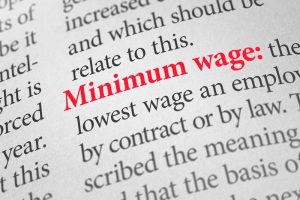National Minimum Wage – who’s entitled to it?

As an employer, you want to ensure you’re paying your staff the right amount for their hard work.
A surprising number of companies are prosecuted every year for not paying the National Minimum Wage (NMW) and National Living Wage (NLW) to their staff. Surprising since the NWM itself is 20 years old.
Unless you are covered by certain exceptions, paying the NMW or NLW is a legal requirement that, if not followed, can have significant and negative consequences for your business.
What is the difference?
The National Minimum Wage applies to any workers between school leaving age and 24 years old. The National Living Wage is the minimum rate paid to those aged 25 and over. These rates are subject to change every April.
Currently, the NLW stands at £7.50 per hour, raising to £7.83 in April 2018. The NMW for those aged 21 to 24 is £7.05, rising to £7.83, and the NMW will rise from £5.60 to £5.90 for all 18 to 20-year olds.
Under 18s are currently paid a minimum of £4.05 per hour, increasing to £4.20 in April, with apprentice wage rising to £3.70 from £3.50 this year.
So, who is entitled to these rates of pay?
Certain workers are entitled to the NMW and NLW – depending on their respective age group – regardless of the hours they work, such as:
- Part-timers
- Agency workers
- Casual labourers, e.g. Those hired for just one day of work
Employees are entitled to the NMW and NLW even if they are not yet qualified or trained, including trainees and workers on probation. Apprentices, if aged under 19 or aged 19+ and in the first year of their apprenticeship, must legally be paid at least the minimum apprentice wage per hour.
Personal circumstances do not affect an employee’s entitlement to the NMW or NLW. These minimum rates must also be paid to:
- Foreign workers, and
- Disabled workers.
The location and nature of the role are also unimportant in some cases, with:
- Seafarers,
- Workers and homeworkers that are paid by the number of sales or items they make,
- Agricultural workers, and
- Offshore workers
…all being entitled to the National Living Wage or National Minimum.
Who is not entitled to NLW or NMW?
Certain employees are not entitled to these rates of pay.
The more notable exceptions include:
- Self-employed people running their own business
- Company directors
- Volunteers or voluntary workers
- Family members of the employer living in the employer’s home
In some cases, if there is no payroll in place, the NMW rates do not apply. A non-family member living in the employer’s home, such as a nanny or housekeeper, will be entitled to NLW or NMW.
However, if the employee shares in both work and leisure activities, is treated as one of the family, and is not charged for meals or accommodation, these rules do not apply.
Some groups of people are also not entitled to the NMW or NLW, such as:
- those of compulsory school age (16 or under)
- members of the armed forces
- people living and working within a religious community
- prisoners
- share fishermen
Those in some forms of education or training are also exempt from the NMW, including:
- workers on government pre-apprenticeships schemes
- people working on a Jobcentre Plus Work trial for 6 weeks
- work shadowing
- a student doing work experience as part of a higher or further education course
- higher and further education students on a work placement for up to 1 year, after which the NLW/NMW must apply
People on certain government or European Union programmes do not need to be paid the minimum wage, such as those on programmes like Leonardo da Vinci, Youth in Action, Erasmus, or Comenius.
HMRC enforce these rates of pay and it is within their rights to visit your premises to check that you are complying with your NMW and NLW obligations as an employer.
If you underpay workers, you will be made to compensate them immediately and pay any non-compliance penalties issued. HMRC may also take you to court on behalf of employees at any time.
To find out what your obligations are, and to ensure you remain compliant, speak to the Burton Beavan team today on 01606 333 900 or email hello@burtonbeavan.co.uk.







